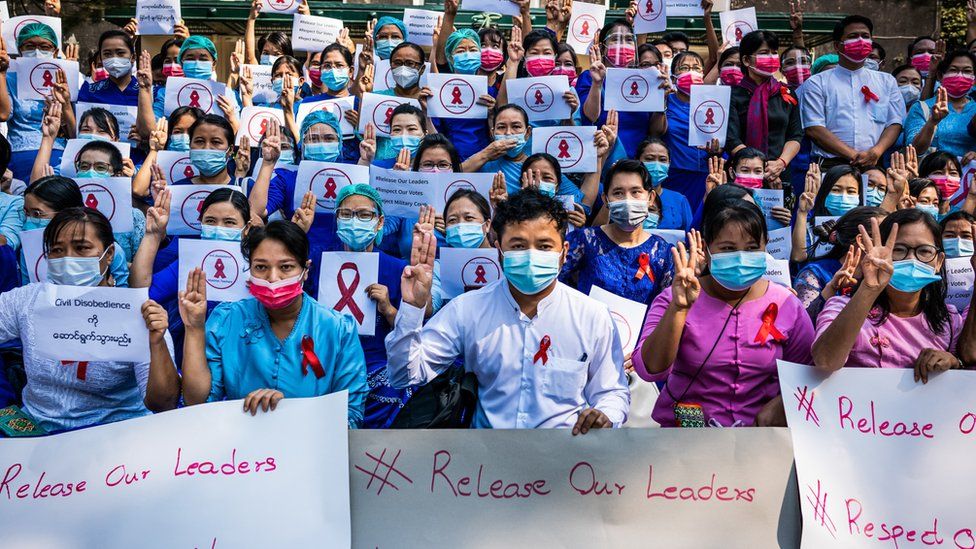Myanmar leader Aung San Suu Kyi and other senior figures from the governing party have been detained in an early morning raid, the spokesman for the governing National League for Democracy said on Monday.
The move comes after days of escalating tension between the civilian government and the powerful military that stirred fears of a coup in the aftermath of an election the army says was fraudulent.
Spokesman Myo Nyunt told Reuters by phone that Aung San Suu Kyi, President Win Myint and other leaders had been “taken” in the early hours of the morning.
“I want to tell our people not to respond rashly and I want them to act according to the law,” he said, adding he also expected to be detained.
The BBC's South East Asia correspondent, Jonathan Head, says there are soldiers on the streets of the capital, Naypyitaw, and the main city, Yangon.
Telephone and internet lines in Naypyitaw have been cut, the BBC's Burmese Service reports.
Soldiers also visited the homes of chief ministers in several regions and took them away, family members said.
On Saturday Myanmar's armed forces promised to abide by the constitution as concerns grew that they were preparing to stage a coup.
On Monday morning, Myanmar state TV said on Facebook it was unable to broadcast.
The raids come after the country’s powerful military raised the spectre of staging a coup as it ramped up demands for an investigation into alleged voter fraud during last year’s election, which was swept by Aung San Suu Kyi’s ruling party.
The National League for Democracy (NLD) won November’s poll in a landslide, but has been much criticised by rights groups for its disenfranchisement of voters in conflict-wracked regions.
The military-aligned opposition disputed the results, while the army has for weeks alleged widespread voter irregularities, claiming to have found 8.6m cases of fraud.
Last week military spokesman Major General Zaw Min Tun said that military chief Min Aung Hlaing – arguably Myanmar’s most powerful individual – had already pointed out “dishonesty and unfairness” during the election.
When pressed on the possibility of a coup, the spokesman refused to be drawn, but did not rule it out.
“We do not say the Tatmadaw will take power. We do not say it will not as well,” said the spokesman, using the Burmese name for the military.
The polls in November were the second openly contested elections since Myanmar emerged in 2011 after nearly 50 years of junta rule.
But the military still holds an outsized role in the country’s politics, retaining control over key ministries thanks to a junta-scripted constitution which dictates an uneasy power-sharing agreement with de facto leader Aung San Suu Kyi.
On Monday Canada’s ambassador to the United Nations, Bob Rae, said there was “no justification for the military detention of Aung Sang Suu Kyi”.
“The Burmese military - the Tatmadaw - must be held to account,” he said.
The move comes after days of escalating tension between the civilian government and the powerful military that stirred fears of a coup in the aftermath of an election the army says was fraudulent.
Spokesman Myo Nyunt told Reuters by phone that Aung San Suu Kyi, President Win Myint and other leaders had been “taken” in the early hours of the morning.
“I want to tell our people not to respond rashly and I want them to act according to the law,” he said, adding he also expected to be detained.
The BBC's South East Asia correspondent, Jonathan Head, says there are soldiers on the streets of the capital, Naypyitaw, and the main city, Yangon.
Telephone and internet lines in Naypyitaw have been cut, the BBC's Burmese Service reports.
Soldiers also visited the homes of chief ministers in several regions and took them away, family members said.
On Saturday Myanmar's armed forces promised to abide by the constitution as concerns grew that they were preparing to stage a coup.
On Monday morning, Myanmar state TV said on Facebook it was unable to broadcast.
The raids come after the country’s powerful military raised the spectre of staging a coup as it ramped up demands for an investigation into alleged voter fraud during last year’s election, which was swept by Aung San Suu Kyi’s ruling party.
The National League for Democracy (NLD) won November’s poll in a landslide, but has been much criticised by rights groups for its disenfranchisement of voters in conflict-wracked regions.
The military-aligned opposition disputed the results, while the army has for weeks alleged widespread voter irregularities, claiming to have found 8.6m cases of fraud.
Last week military spokesman Major General Zaw Min Tun said that military chief Min Aung Hlaing – arguably Myanmar’s most powerful individual – had already pointed out “dishonesty and unfairness” during the election.
When pressed on the possibility of a coup, the spokesman refused to be drawn, but did not rule it out.
“We do not say the Tatmadaw will take power. We do not say it will not as well,” said the spokesman, using the Burmese name for the military.
The polls in November were the second openly contested elections since Myanmar emerged in 2011 after nearly 50 years of junta rule.
But the military still holds an outsized role in the country’s politics, retaining control over key ministries thanks to a junta-scripted constitution which dictates an uneasy power-sharing agreement with de facto leader Aung San Suu Kyi.
On Monday Canada’s ambassador to the United Nations, Bob Rae, said there was “no justification for the military detention of Aung Sang Suu Kyi”.
“The Burmese military - the Tatmadaw - must be held to account,” he said.
Last edited:







